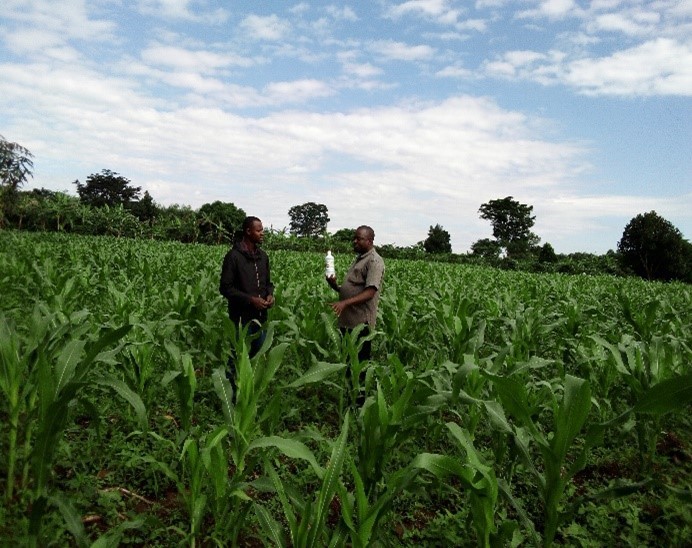We produce agroecological biofertilizers for small-scale farmers in Uganda to enhance agricultural productivity. Our biofertilizers mitigate climate change, improve soil health, are 100% organic with no harm to the environment, and accelerate plant growth rates, leading to higher agricultural productivity.
Efficiency for the use of biofertilizers into small scale farmers in Mityana

Ugandan food is treated with dozens of chemicals that are banned from use in other countries with a study capturing with the most chemical residue in Ankole subregion Page 3 SUNDAY MONITOR November 2023. These inappropriate inputs pollute the environment killing the biodiversity, limit the production of healthy food restricting Ugandan foods on international market though affecting Ugandan consumers with cancerous diseases which affect our life span.
Background
In Uganda, the use of toxic farm inputs has history and contemporary roots as some factors;
- Increase Population growth and food insecurity leading to increased pressure on agricultural systems to produce more food.
- Limited awareness and Education of farmers on Eco friendly sustainable inputs that have no harm to the environment
- Market influence and accessibility where synthetic inputs have a bigger visibility in Agro shops highly accessed by farmers
- Government policies and subsides where government extension service promote use of toxic inputs While the use of toxic farm inputs may provide short-term benefits in terms of increased yields, there are growing concerns about the long-term sustainability, environmental impact, and potential health risks associated with their use. Efforts are being made in Uganda to promote sustainable agricultural practices, including the adoption of organic farming techniques and the use of biofertilizers to address these challenges and build a more resilient agricultural systemm
We produce agroecological biofertilizers for small-scale farmers in Uganda.
Our product:
- Improves soil health
- 100% organic
- Increases agricultural productivity by 25%
- Mitigates climate change
Leading the initiative are Elizabeth Kabakoyo, the Founder, and Luwemba Emmanuel, the Co-Founder. Elizabeth is a young Ugandan agricultural extensionist and a leader in the World Food Forum's national chapter in Uganda. She has been recognized for her work in improving soil health and was a finalist for the Uganda National Organic Sector Award in 2023. Luwemba is a young male farmer and soil scientist with a passion for organic farming, known for his expertise in training farmers on waste management for fertilizer production.
Our target market includes both B2B (agro dealers) and B2C (small-scale farmers). Our business model involves direct sales to farmers through demonstration gardens, sales agents, and partnerships with agro dealers.
Eco organic fertilizer have reached out to 410 small scale farmers including youth and women which have;
- Enhanced crop resilience, Eco organic fertilizer stimulates the plants natural defense mechanisms which enables crops to environmental stressors like drought and certain diseases and pests improving healthy agricultural output to rural youth and women
- Reduced dependency on chemical fertilizer.by using Eco organic fertilizer reduce the need of systemic chemical fertilizers mitigating negative environmental impact associated with over use of chemical fertilizer
- Cost savings for rural women and youth, farmers experience cost savings as use of biofertilizers be a more cost effective with better results
Technical resources
- There is availability and accessibility of Raw materials from Busunju food daily market and Namulamba community with a production unit for composting and anerobic process to produce Eco organic fertilizer
- Skilled support team that helps monitoring of farmer gardens, collection of raw materials, processing, packaging, distribution and market refer sale to Agro dealers and small-scale farmers
- Environmental consideration as we are mindful in protecting soil healthy with nutrient content fertilizers produced with ease access to organic raw material such as a
Economic viability
- Cost of raw materials, the cost availability and transportation of organic waste materials significantly impact production costs. Local sourcing is more cost-effective than importing materials
- The cost of raw materials is affordable to source and transport them to production unit and still hard for distribution of our products to far farmers
- High cost of certification has yet limited us from certifying our product though samples are with PELUM UGANDA for nutrient analysis Though it’s still costly for us to certify our fertilizer to wider reach on far market
Scaling up: Expansion of the production unit to increase capacity of organic fertilizer produced ensuring a steady and suffient supply to meet growing demand in different geographic areas
Scaling deep: Engage with local communities, agricultural extension services in setting up demonstration gardens for farmers to deepen their understanding of the benefits of organic fertilizer.
Scaling out: Replicate successful organic fertilizer production models like setting up demonstration gardens on farmer sites in various locations, sharing knowledge and building partnerships to facilitate the adoption of organic fertilizers on a broader scale with organic policy encouraging the use of organic fertilizers into small scale farmers
The biofertilizer business presents significant opportunities for youth and women, particularly as awareness of sustainable agriculture grows. Key opportunities include:
- There is an increasing demand and preference for organic produce, aligning with market trends for chemical-free and environmentally friendly products. This trend supports the adoption of organic farming practices among women and youth farmers.
- Biofertilizers with biocontrol properties offer integrated solutions for pest and disease management. Combining fertilization with pest control in a single product can provide comprehensive solutions tailored to rural women and youth farmers.
- Current government support and incentives for organic farming are expected to foster business growth and encourage the widespread adoption of biofertilizers.
- Youth involvement in research and innovation in biofertilizer technology holds potential for developing new products, thereby creating employment opportunities.
- The growing interest in climate-smart agriculture practices promotes sustainable farming by reducing greenhouse gas emissions and advocating for smart agricultural practices, which aligns with the goals of youth and women in agriculture.

